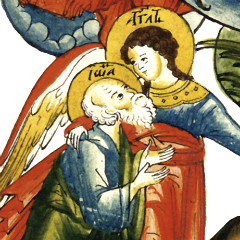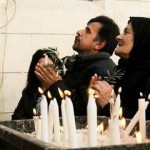
Modern Christians have a tendency to view their prayer life as a private matter. But as I discovered while researching my book Lifted by Angels, our counterparts in the early church assumed the active participation of angels in believers’ prayer lives.
“[T]he angel of each of us prays alongside us,” wrote the third-century theologian Origen in his primer on prayer.
How do we know when angels are present? Feelings of comfort, humility, and joy indicate their presence. When those feelings come, according to monastic guide John Climacus in The Ladder of Divine Ascent, we should “hasten to prayer, for our good guardian has come to pray with us.”
Our awareness of the angel’s presence may grow as we pray. “If you feel sweetness or compunction at some word of your prayer, dwell on it,” said Climacus, “for then our guardian angel is praying with us.”
Angelic models for prayer
For ancient Christians like Origen, Climacus, and others, this angelic presence in prayer served as a model for prayer itself.
Their writings assumed a certain gravity to what Climacus termed “the work of angels.” Sometimes we pray as we stir in the morning; other times in the thick of the day or during the drowsy moments before sleep. In all settings, the ancient preachers and theologians of the church advised that believers be sober and watchful like the angels.
In one of his homilies on the Epistle to the Hebrews, John Chrysostom offered the unseemly picture of a man approaching God while “gaping and scratching himself,” as angels “stand by in fear and trembling.”
Fourth-century monastic Evagrius is less glib. “Arouse yourself, wretch; your Lord is speaking with you,” he said, apparently unworried about offending his listeners. “Do not wander off. His elect angels surround you, do not be dismayed; the ranks of the demons stand facing you, so do not grow lax.”
As the ancient Christians understood things, prayer is serious work and requires sober-minded practitioners. Our best bet is to imitate the watchfulness of the angels who pray with us.
Don’t ask for the dunghill
Knowing with whom and to whom we pray should also inform for what we pray.
Isaac the Syrian said that when we ask for frivolous and base things, it’s like a subject standing before his king and imploring him for a measure of manure. The request insults both the king and the subject.
As if to make the embarrassment all the more apparent, Isaac reminded us that “the King’s great officials”–angels and archangels–“are gazing steadfastly upon you at the time of your prayer to see what petition you will make of their Master; and they are astonished and exultant whenever they behold one who is made of earth forsake his dunghill and ask for what is heavenly.”
Swarms of demons
Importantly, as Evagrius said, it’s not just the good and holy angels who are present when we pray. Sometimes the fallen angels, the demons, are there as well, conjuring distraction, worry, and fear. Because of the power of prayer and its function of drawing us closer to God, demons are anxious to spoil our efforts.
Climacus wrote about the demon of grief that “tries to devastate our prayer” by making our sins seem great and God distant.
Another writer, Martyrius, related how Satan tries to bring slumber to our minds and eyes when he sees us “keeping vigil with our Lord . . . exhibiting the wakefulness of the angels.”
Our prayers, said Climacus, are followed by “swarms of demons,” who attempt to steal our spiritual gains. If we stay the course, their attacks amount to nothing. As believers press through the difficulties and grow in prayer, we find “the unholy spirits . . . flee as from fire when scourged by prayer.”
Perhaps all of this raises more questions than it answers. But it certainly serves to instruct us that prayer is anything but solitary. The work of angels is something in which we participate, carrying on the labor amid the company of a great and heavenly host.












